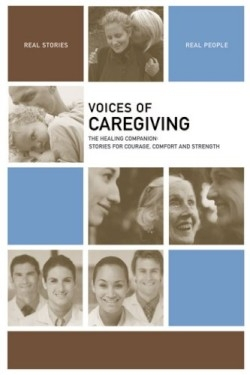Voices of Caregiving
Stories for Courage, Comfort, and Strength
I’m not usually one to get teary-eyed. Lately, though, that is exactly what I’ve been doing. I’ve been crying at night, as quietly as I can. I’ve cried in the shower. I’ve cried as I put laundry in the washer and dryer. It seems so overwhelming most of the time that it is easy to lose control as I watch him get weaker.
The speaker is a woman, a college teacher, who feels a wealth of emotions while caring for her sick, eld-erly father. Her voice joins nearly forty others as wives, husbands, brothers, sons, daughters, nieces, mothers, fathers, and grandchildren put pen to paper to write a bit about their lives while giving care to family members through chronic, near-fatal, and fatal illnesses.
This is the sixth book in the “Voices of” series put together by the Healing Project, an organization dedicated to promoting the health and well-being of those suffering from such medical diagnoses. Previous books dealt with topics such as alcoholism, Alzheimer’s, autism, and breast and lung cancer. Developing resources and assisting caregivers are also areas of concern.
Debra LaChance founded the Healing Project in 2005 after she discovered she had breast cancer. Only minutes after her diagnosis, she went outside in her adopted home city of New York. “Walking the busy streets of Manhattan on a beautiful sunny day, I was surrounded by people but I’d never felt so alone.” She wanted and needed a sense of connection with others going through something similar—“real stories of real people”—and so the Healing Project was born.
The Healing Project has tapped into a very timely subject: It’s estimated that there are sixty million people currently caring for family members; that doesn’t include the rising numbers that will undoubtedly accompany the aging baby-boomer population. But it’s the real-life stories readers will remember.
There’s Rose, who was married to Bert for over sixty years when she was diagnosed with Alzheimer’s. Bert’s motto is, “A bi m’lacht,” Yiddish for “as long as you can laugh.” Their ongoing story, “For the Love of Rose,” is told by a social worker who knows the couple.
A twenty-two-year-old co-ed helps her fifty-three-year-old mother take her last shower at home, at the end of an eight-year struggle with breast cancer. The child becomes the parent as she washes and dries her mother’s battle-scarred body in “April Showers.”
In “Letting Go,” a husband diagnosed with Alzheimer’s flies into rages as his wife deflects both physical and verbal blows. She relates how his angry leaving one night prompts her to rearrange their life together as they’ve known it. They also take a highly anticipated trip to Holland to visit his mother: “Sadly, two weeks after our return, he forgot that we had seen (her).” She recognizes his life is out of their control and that she can only “provide love, respect, understanding, and, lacking a road map, to seek out the best road, to soften the sharp curves and walk beside him as far as I could go.”
Several husbands write of their wives’ journeys through breast cancer and offer advice, some tenderly, some soberly, and some with humor. In “A Crash Course: How to Be a Do-Right Cancer Hus-band,” one man offers two bits of simplistic wisdom: “Dude, get her flowers!” and “Shut up and listen!”
The stories are divided into categories: learning, commitment, compassion, patience, forgiveness, and humor, though most seem to fit appropriately under a main category of “heartbreaking.”
Appearing intermittently among the stories is a longer article describing palliative care and hospice. Palliative care is an emerging field that focuses on “striving to minimize the patient’s burden and maximize his/her quality of life.” There’s also an interesting piece about Chinese medicine, particularly the Shen, or the spirit.
Those who work in the healthcare field and families who are dealing with life-threatening or chronic illnesses will find encouragement in the words of others going through similar life-altering situations.
As a woman and her ailing mother-in-law were conversing about why God wouldn’t let the elderly woman die, the younger woman said that she had taught her so much about how to be good daughter-in-law that maybe that’s what she was still doing.
“Without a moment’s hesitation, the older woman replied, “Well, Nancy, will you please hurry up and learn your lesson so I can go?”
Disclosure: This article is not an endorsement, but a review. The publisher of this book provided free copies of the book to have their book reviewed by a professional reviewer. No fee was paid by the publisher for this review. Foreword Reviews only recommends books that we love. Foreword Magazine, Inc. is disclosing this in accordance with the Federal Trade Commission’s 16 CFR, Part 255.

